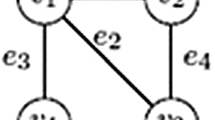Abstract
Stable flows generalize the well-known concept of stable matchings to markets in which transactions may involve several agents, forwarding flow from one to another. An instance of the problem consists of a capacitated directed network in which vertices express their preferences over their incident edges. A network flow is stable if there is no group of vertices that all could benefit from rerouting the flow along a walk. Fleiner (Algorithms 7:1–14, 2014) established that a stable flow always exists by reducing it to the stable allocation problem. We present an augmenting path algorithm for computing a stable flow, the first algorithm that achieves polynomial running time for this problem without using stable allocations as a black-box subroutine. We further consider the problem of finding a stable flow such that the flow value on every edge is within a given interval. For this problem, we present an elegant graph transformation and based on this, we devise a simple and fast algorithm, which also can be used to find a solution to the stable marriage problem with forced and forbidden edges. Finally, we study the stable multicommodity flow model introduced by Király and Pap (Algorithms 6:161–168, 2013). The original model is highly involved and allows for commodity-dependent preference lists at the vertices and commodity-specific edge capacities. We present several graph-based reductions that show equivalence to a significantly simpler model. We further show that it is \({\textsf {NP}}\)-complete to decide whether an integral solution exists.











Similar content being viewed by others
References
Baïou, M., Balinski, M.: Many-to-many matching: stable polyandrous polygamy (or polygamous polyandry). Discrete Appl. Math. 101, 1–12 (2000)
Balinski, M., Sönmez, T.: A tale of two mechanisms: student placement. J. Econ. Theory 84, 73–94 (1999)
Biró, P., Kern, W., Paulusma, D., Wojuteczky, P.: The stable fixtures problem with payments. Games Econ. Behav. 108, 245–268 (2017)
Braun, S., Dwenger, N., Kübler, D.: Telling the truth may not pay off: an empirical study of centralized university admissions in Germany. B.E. J. Econ. Anal. Policy (2010). https://doi.org/10.2202/1935-1682.2294
Chen, Y., Sönmez, T.: Improving efficiency of on-campus housing: an experimental study. Am. Econ. Rev. 92, 1669–1686 (2002)
Cseh, Á., Manlove, D.F.: Stable marriage and roommates problems with restricted edges: complexity and approximability. Discrete Optim. 20, 62–89 (2016)
Cseh, Á., Matuschke, J., Skutella, M.: Stable flows over time. Algorithms 6, 532–545 (2013)
Dean, B.C., Munshi, S.: Faster algorithms for stable allocation problems. Algorithmica 58, 59–81 (2010)
Dias, V.M.F., da Fonseca, G.D., de Figueiredo, C.M.H., Szwarcfiter, J.L.: The stable marriage problem with restricted pairs. Theor. Comput. Sci. 306, 391–405 (2003)
Feder, T.: A new fixed point approach for stable networks and stable marriages. J. Comput. Syst. Sci. 45, 233–284 (1992)
Feder, T.: Network flow and 2-satisfiability. Algorithmica 11, 291–319 (1994)
Fleiner, T.: On the stable \(b\)-matching polytope. Math. Soc. Sci. 46, 149–158 (2003)
Fleiner, T.: On stable matchings and flows. Algorithms 7, 1–14 (2014)
Fleiner, T., Irving, R.W., Manlove, D.F.: Efficient algorithms for generalised stable marriage and roommates problems. Theor. Comput. Sci. 381, 162–176 (2007)
Fleiner, T., Jagadeesan, R., Jankó, Z., Teytelboym, A.: Trading networks with frictions. In: Proceedings of the 2018 ACM Conference on Economics and Computation. ACM, pp. 615–615 (2018)
Fleiner, T., Jankó, Z., Schlotter, I., Teytelboym, A.: Complexity of stability in trading networks. arXiv preprint arXiv:1805.08758 (2018)
Ford, L.R., Fulkerson, D.R.: Flows in Networks. Princeton University Press, Princeton (1962)
Gai, A.T., Lebedev, D., Mathieu, F., de Montgolfier, F., Reynier, J., Viennot, L.: Acyclic preference systems in P2P networks. In: Kermarrec, A., Bougé, L., Priol, T. (eds.) Proceedings of Euro-Par ’07 (European Conference on Parallel and Distributed Computing): The 13th International Euro-Par Conference. Lecture Notes in Computer Science, vol. 4641, pp. 825–834. Springer (2007)
Gale, D., Shapley, L.S.: College admissions and the stability of marriage. Am. Math. Mon. 69, 9–15 (1962)
Gale, D., Sotomayor, M.: Some remarks on the stable matching problem. Discrete Appl. Math. 11, 223–232 (1985)
Garey, M.R., Johnson, D.S.: Computers and Intractability. Freeman, San Francisco (1979)
Gusfield, D., Irving, R.W.: The Stable Marriage Problem: Structure and Algorithms. MIT Press, Cambridge (1989)
Irving, R.W., Leather, P., Gusfield, D.: An efficient algorithm for the “optimal” stable marriage. J. ACM 34, 532–543 (1987)
Jagadeesan, R.: Complementary inputs and the existence of stable outcomes in large trading networks. In: Proceedings of the 2017 ACM Conference on Economics and Computation. ACM, pp. 265–265 (2017)
Jewell, W.S.: Multi-commodity Network Solutions. Operations Research Center, University of California, California (1966)
Király, T., Pap, J.: A note on kernels and Sperner’s Lemma. Discrete Appl. Math. 157, 3327–3331 (2009)
Király, T., Pap, J.: Stable multicommodity flows. Algorithms 6, 161–168 (2013). https://doi.org/10.3390/a6010161
Knuth, D.: Mariages Stables. Les Presses de L’Université de Montréal (1976). In: English translation in Stable Marriage and its Relation to Other Combinatorial Problems, vol. 10 of CRM Proceedings and Lecture Notes, American Mathematical Society (1997)
Lin, Y.S., Nguyen, T.: On variants of network flow stability. arXiv preprint arXiv:1710.03091 (2017)
Ostrovsky, M.: Stability in supply chain networks. Am. Econ. Rev. 98, 897–923 (2008)
Papadimitriou, C.H.: On the complexity of the parity argument and other inefficient proofs of existence. J. Comput. Syst. Sci. 48, 498–532 (1994)
Perach, N., Polak, J., Rothblum, U.G.: A stable matching model with an entrance criterion applied to the assignment of students to dormitories at the Technion. Int. Jo. Game Theory 36, 519–535 (2008)
Roth, A.E.: The evolution of the labor market for medical interns and residents: a case study in game theory. J. Polit. Econ. 92, 991–1016 (1984)
Roth, A.E., Sotomayor, M.A.O.: Two-Sided Matching: A Study in Game-Theoretic Modeling and Analysis. Econometric Society Monographs, vol. 18. Cambridge University Press, Cambridge (1990)
Shepherd, F.B., Vetta, A., Wilfong, G.T.: Polylogarithmic approximations for the capacitated single-sink confluent flow problem. In: 2015 IEEE 56th Annual Symposium on Foundations of Computer Science (FOCS). IEEE, pp. 748–758 (2015)
Tardos, É.: A strongly polynomial algorithm to solve combinatorial linear programs. Oper. Res. 34, 250–256 (1986)
Acknowledgements
We thank Tamás Fleiner for discussions on Lemma 3, and our reviewers for their suggestions that significantly improved the presentation of the paper.
Author information
Authors and Affiliations
Corresponding author
Additional information
Publisher's Note
Springer Nature remains neutral with regard to jurisdictional claims in published maps and institutional affiliations.
A preliminary version of this paper appeared at the 43rd International Workshop on Graph-Theoretic Concepts in Computer Science (WG 2017). The authors were supported by Cooperation of Excellences Grant (KEP-6/2018), by the Ministry of Human Resources under its New National Excellence Programme (UNKP-18-4-BME-331), the Hungarian Academy of Sciences under its Momentum Programme (LP2016-3/2016), its János Bolyai Research Fellowship, OTKA Grant K128611, COST Action IC1205 on Computational Social Choice, and by the Alexander von Humboldt Foundation with funds of the German Federal Ministry of Education and Research (BMBF).
Rights and permissions
About this article
Cite this article
Cseh, Á., Matuschke, J. New and Simple Algorithms for Stable Flow Problems. Algorithmica 81, 2557–2591 (2019). https://doi.org/10.1007/s00453-018-00544-7
Received:
Accepted:
Published:
Issue Date:
DOI: https://doi.org/10.1007/s00453-018-00544-7




